- Home
- Ernest Hemingway
Dateline- Toronto Page 17
Dateline- Toronto Read online
Page 17
A statement from Lloyd George was eagerly awaited. The British premier promises France that existing treaties should not be abrogated by any action at Genoa. The French look to the British premier to call upon Germany and Russia to renounce the Treaty of Rapallo.
Italy, which hitherto has backed Lloyd George against the French, is openly opposed to permitting the Russo-German treaty.
Russian Girls at Genoa
The Toronto Daily Star
April 24, 1922
GENOA, ITALY.—The great hall of the Palazzo San Giorgio, where the sessions of the Genoa Conference are held, is about half the size of Massey Hall [Toronto] and is overlooked by a marble statue of Columbus sitting on a pale marble throne sunk deep into the wall.
Columbus, and the press gallery at the other end of the hall, look down on a rectangle of green-covered tables arranged in the familiar shape of tables at banquets, lodges, Y.M.C.A. dinners and college reunions. There is a white pad of paper at each table that, from the press gallery, looks like a tablecloth, and for two hours before the conference opened a woman in a salmon-covered hat arranged and rearranged the inkwells at the long rectangle of tables.
At the left of the statue of Columbus, a marble plaque twelve feet high is set into the wall bearing a quotation from Machiavelli’s history, telling of the founding of the Banco San Giorgio, site of the present palace, the oldest bank in the world. Machiavelli, in his day, wrote a book that could be used as a textbook by all conferences, and from all results, is diligently studied.
To the left of the rather pompous marble Columbus is another plaque similar in size to the quotation from Machiavelli on which is carved two letters from Columbus to the Queen of Spain and the Commune of Genoa. Both letters are highly optimistic in tone.
Delegates began to come into the hall in groups. They cannot find their place at the table, and stand talking. The rows of camp chairs that are to hold the invited guests begin to be filled with the top-hatted, white-mustached senators and women in Paris hats and wonderful wealth-reeking fur coats. The fur coats are the most beautiful things in the hall.
There is an enormous chandelier, with globes as big as association footballs, hanging above the tables. It is made up of a tangled mass of griffons and unidentified beasts and when it switches on everyone in the press gallery is temporarily blinded. All around the wall of the hall are the pale marble effigies of the fine, swashbuckling pirates and traders that made Genoa a power in the old days when all the cities of Italy were at one another’s throats.
The press gallery fills up and the British and American correspondents light cigarettes and identify for one another the various bowing delegates as they enter the hall at the far end. The Poles and Serbs are the first in; then they come in crowds carrying their eight-quart silk hats. Marcel Cachin, editor of Humanité, circulation 250,000, and leader of the French Communist party, comes in and sits behind me. He has a drooping face, frayed red mustache and his black tortoise-shell spectacles are constantly on the point of sliding off the tip of his nose. He has a very rich wife and can afford to be a Communist.
Next to him sits Max Eastman, editor of The Masses, who is doing a series of special articles for a New York paper and who looks like a big, jolly, middle-western college professor. He and Cachin converse with difficulty.
Movie men set up a camera under the nose of the niched-in Genoese heroes who look down at it with a frozen marble expression of disapproval. The Archbishop of Genoa in wine-colored robes and a red skullcap stands talking with an old Italian general with a withered apple of a face and five wound stripes. The old general is General Gonzaga, commander of the cavalry corps; he looks a sunken-faced, kind-eyed Attila with his sweeps of mustaches.
The hall is as noisy as a tea party. Journalists have filled the gallery, there is only room for 200 and there are 750 applicants and many latecomers sit on the floor.
When the hall is nearly full, the British delegation enters. They have come in motorcars through the troop-lined streets and enter with élan. They are the best-dressed delegation. Sir Charles Blair Gordon, head of the Canadian delegation, is blond, ruddy-faced and a little ill at ease. He is seated fourth from Lloyd George’s left at the long table.
Walter Rathenau, with the baldest bald head at the conference and a scientist’s face, comes in accompanied by Dr. Wirth, German chancellor, who looks like a tuba player in a German band. They are halfway down one of the long tables. Rathenau is another wealthy Socialist and considered the ablest man in Germany.
Prime Minister Facta of Italy takes the chair. So obscure has been his political career, until he came into light as a compromise premier when it looked as though Italy would be unable to form a cabinet, that biographies of him were issued to all the newspapermen by the Italian government.
Everyone is in the room but the Russians. The hall is crowded and sweltering and the four empty chairs of the Soviet delegation are the four emptiest-looking chairs I have ever seen. Everyone is wondering whether they will not appear. Finally they come through the door and start making their way through the crowd. Lloyd George looks at them intently, fingering his glasses.
Litvinoff with a big ham-like face is in the lead. He is wearing the rectangular red insignia. After him comes Tchitcherin with his indeterminate face, his indefinite beard and his nervous hands. They blink at the light from the chandelier. Krassin is next. He has a mean face and a carefully tailored Van Dyke beard and looks like a prosperous dentist. Joffe is last. He has a long, narrow, spade beard, and wears gold-rimmed glasses.
A mass of secretaries follow the Russian delegates, including two girls with fresh faces, hair bobbed in the fashion started by Irene Castle, and with modish tailored suits. They are far and away the best-looking girls in the conference hall.
The Russians are seated. Some one hisses for silence, and Signor Facta starts the dreary round of speeches that sends the conference under way.
Barthou Crosses Hissing Tchitcherin
The Toronto Daily Star
April 24, 1922
GENOA.—There was a sensation at the opening of the Genoa Conference greater than Secretary Hughes’ naval scrapping speech at Washington—but it came when the scheduled speeches had been droned through and most of the newspapermen had left the hall to put their cut-and-dried reports of the opening on to the cables.
Suddenly into the fatigue-charged air of a crowded roomful of people who had heard speeches for four hours came an instantaneous electric thrill. Tchitcherin, head of the Soviet delegation, looking like a country grocery storekeeper with a ragged indefinite beard and a hissing purr of a voice that was almost un-understandable in the press gallery, had just taken his seat at the green-covered rectangle of tables.
“Is there anyone else that would like to speak?” asked Signor Facta, president of the conference, in Italian.
“The president asks if there is anyone else that wants to speak,” translated the English interpreter, a square-faced woman with a high, theatrical voice.
M. Barthou, heading the French delegation, rose to his feet and launched into a passionate torrent of words. Barthou looks like the left-hand one of the Smith Brothers and waddles when he walks but speaks with the impassioned vigor and earnestness of the French orator.
Suddenly the dull, sleepy atmosphere of the foul-aired conference hall was cut through as by a flash of summer lightning. The correspondents who had been sitting heavily in the press gallery began to take notes like mad. The delegates who had been leaning back in their chairs anticipating an adjournment of the conference, stiffened forward to attention, Tchitcherin’s hand began to tremble on the table and Lloyd George began to draw meaningless designs on the pad of paper before him.
All the “wise” journalists had left the hall when Tchitcherin stopped speaking. Only a few remained who believed in seeing a game through until the last man is out in the ninth inning.
Barthou stopped speaking and the interpreter who has officiated at every conference since the
first session of the League of Nations started his translation into English in a ringing voice. “If this question of disarmament is brought up, France will absolutely, categorically, and finally refuse to discuss it, either in plenary session or in any committee. In the name of France I make this definite protest—”
The interpreter went on with the speech. He finished.
Tchitcherin rose and, his hands shaking, spoke in French, in his queer, hissing accents, the result of an accident that knocked out half his teeth. The interpreter with the ringing voice translated. There was not a sound in the pauses except the clink of the mass of decorations on an Italian general’s chest as he shifted from one foot to another. It is an actual fact. You could hear the faint metallic clink of the hanging decorations.
“In regard to disarmament,” the interpreter said for Tchitcherin. “Russia took the attitude of France from M. Briand’s Washington speech. In this speech he said France must stay armed because of the danger of Russia’s great army. I, for Russia, want to remove this danger.
“In regard to a succession of conferences I am only quoting from Lloyd George’s speech to the British parliament. Monsieur Poincaré has said that the aims of the Genoa Conference have not been clearly outlined. There are several questions up for discussion here that were not in the Cannes agenda. If it is the collective will of the conference that disarmament should not be discussed, I will bow to the will of the conference. But disarmament is a capital question with Russia.”
The interpreter sat down and Lloyd George got up. The conference was in a turmoil. It looked as though the French might walk out at any moment. Lloyd George, the greatest compromiser politics has ever seen, talked against time. He urged Tchitcherin in his suave manner not to overload the ship of Genoa with too many matters for discussion.
“Unless the Genoa Conference leads to disarmament it will be a failure,” he said. “But we must prepare first. We must first settle other questions. I ask Mr. Tchitcherin to be calm. Let us bring this ship into port first before we start any other voyages. I suggest we drop the question of a universal conference at present.” And so he continued talking against time and attempting to save the conference.
“The agenda of the Genoa Conference was sent out in the two finest languages in the world—English and French!” he said in the course of his rambling and conciliatory speech, masterly in its soothing and soporific effect on most of the delegates, for at this slip the Italians looked black and all the effect of Lloyd George’s careful compliments earlier in the day was destroyed.
In the end Signor Facta adjourned the meeting, cutting off both Barthou and Tchitcherin who attempted to speak. “It is over. You have spoken. We must adjourn!” And the conference was saved from blowing up on the first day.
Stambouliski of Bulgaria
The Toronto Daily Star
April 25, 1922
GENOA.—In the rows of white faces gathered around the green baize tables at the sessions of the Genoa Conference, the weatherbeaten red face of [Aleksandr] Stambouliski, prime minister of Bulgaria, stood out like a ripe blackberry in a bunch of daisies.
Stambouliski is chunky, red-brown-faced, has a black mustache that turns up like a sergeant major’s, understands not a word of any language except Bulgarian, once made a speech of fifteen hours’ duration in that guttural tongue, and is the strongest premier in Europe—bar none.
For years as leader of the agrarian, or Farmers’, party, Stambouliski fought to keep Bulgaria out of the various Balkan wars. He had one idea. Bulgaria was a farming country and her salvation lay in farming, not fighting. He opposed Bulgaria going into the European war on the side of Germany.
“This step will cost you your head,” he shouted at King Ferdinand and Ferdinand had him put into prison. Twice, for his attitude during the war, he was condemned to death; but the government lacked the courage to carry out the sentences for Stambouliski is the idol of the sheepskin-coated, ragged, dirty, courageous and hardworking farmers that make up eighty-five percent of Bulgaria’s population.
When the army started drifting back after the armistice with revolutionary committees at the head of the various regiments, and it looked as though Bulgaria was going down to bolshevism as fast as greased skids could carry her, King Ferdinand sent for Stambouliski to be brought to him.
“Can you hold things together if I make you premier?” Ferdinand asked the man who was under sentence of death.
“I can never work with you and never will!” Stambouliski roared. “There is only one thing for you to do—get out of the country!” Ferdinand being a keen judge of situations, very promptly got out.
Boris, his son, wanted to leave the country with his father. Stambouliski took him by the shoulder.
“If you attempt to leave Bulgaria I will put you under arrest,” he said. “You are the new king.”
So now Boris, a polished, good-humored, cosmopolitan youth is king, and being king consists in interpreting for Stambouliski, who comes into Sofia often enough from his farm to see that the government is running all right. Sometimes he stays on the farm for two and three weeks at a time. There are no telephone connections and ambassadors wait those two or three weeks to see him. Then he comes in, calls in Boris to interpret, tells the ambassador what he wants and what he does not want, what he will do and what he will not do, and goes back to his farm.
There are no internal problems in Bulgaria, there are no troublesome minorities. The Farmers’ party—and they are actually farmers, attending parliament in their sheep coats and mud-covered boots—have 150 representatives. The Communist party is next with 50 members. The only other members are the two bourgeois representatives who have the inalienable right of all minorities—that to endorse.
It was at a meeting of the Farmers’ party that Stambouliski made his famous fifteen-hour speech. That speech broke the hearts of the Communists. It is no good opposing a man of few words who can talk for fifteen hours.
Bulgaria is much better off than Serbia, who has to maintain a large army to keep all her troublesome “New Serbs” in order, many of them having no desire to be Serbs at all. Bulgaria is well fed also, while Europe all around her is starving, because Stambouliski keeps her farming.
At the conference, Stambouliski sits forward in his chair, looks at the ceiling with his bull-like old face, and the light from the great chandelier glints on his shiny, blue serge suit. Occasionally a slightly less stolid expression comes over his face, it relaxes just the least bit, that is the nearest he ever comes to smiling. When that expression comes it means that Stambouliski is thinking that while the conference at Genoa is going on, back in Bulgaria men are farming.
Schober Every Inch a Chancellor
The Toronto Daily Star
April 26, 1922
GENOA.—Chancellor Schober of Austria is a white-haired old aristocrat, who took the post of chancellor for the remains of the Hapsburg Empire, after Austria had been using up about one prime minister a month and premiers were as popular as the income tax collector. He did not want the job but public opinion forced him into it, and since he has taken hold, Austria has gained the firmest position she has held in Central Europe since the break-up after the armistice.
Chancellor Schober is the only man at the Genoa Conference, with the exception of Lloyd George, that looks the romantic conception of what a chancellor should look. He has a stately presence and carriage, a patrician face, and a high forehead with his head of white hair brushed back.
For forty years under Emperor Franz Joseph and his son Carl, just dead in exile in Madeira, Schober was head of the police department of that strange jumble of geography that was the Austrian Empire. And when the new Austrian Socialist republic finally got completely sick of political leaders and wanted an administrator to head the government, they chose Schober.
After Austria’s revolution, which came at a time when all of Europe was going off into revolutions like a pack of firecrackers, Austria reformed her army. The Socialists wer
e in power and so all the men who tried to enlist in the army who were not Socialists were declared by the examining surgeons to have flat feet, defective lumbar vertebrae, cauliflower ears or some such physical reason for keeping them out of the service. The result was that a ninety-nine percent Socialist army was formed. The one percent who turned out not to be Socialists were promptly weeded out on account of astigmatism, myasma, myopia, too many wisdom teeth or some such cause and replaced by some of the comrades.
This Socialist army was lodged in barracks that were like country clubs, had unlimited leisure and entertainments, was well fed and happy and incidentally gave the Socialists complete control of the country. It began to be very difficult not to be a Socialist with the army to back up all promulgations of the Socialist party. The country was near to going into a sort of guerrilla warfare between the Conservatives and the army when Schober brought order out of the whole mess by a very simple procedure.
Schober, with forty years of police work to back him up, formed a government police force with authority to arrest all lawbreakers regardless of their political beliefs. With his experience, he picked and trained this force of twelve thousand men until they attained a morale and esprit de corps like that of the Royal North-West Mounted Police. In a very short time there was order in Austria. If someone threw a brick as the Socialist army marched past, Schober’s men arrested the brick thrower. If members of the Socialist army coerced or beat anyone, Schober’s men arrested the Socialist soldiers. It worked wonderfully.
So when Austria sickened of a series of prime ministers who went galloping into office under their promises to obtain credits from the Allies, and came sneaking out of office as soon as it became very apparent there were to be no credits, the Republican government turned to Herr Schober, the old Monarchist.

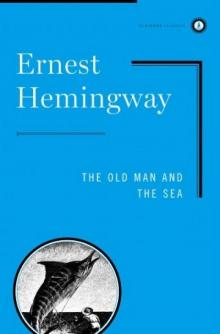 The Old Man and the Sea
The Old Man and the Sea Green Hills of Africa
Green Hills of Africa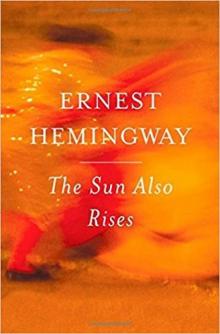 The Sun Also Rises
The Sun Also Rises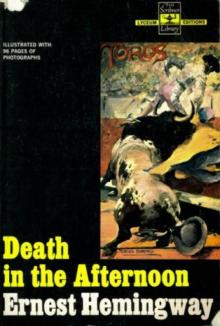 Death in the Afternoon
Death in the Afternoon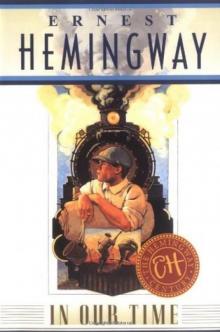 In Our Time
In Our Time For Whom the Bell Tolls
For Whom the Bell Tolls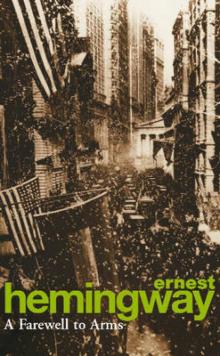 A Farewell to Arms
A Farewell to Arms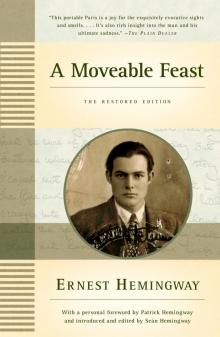 A Moveable Feast
A Moveable Feast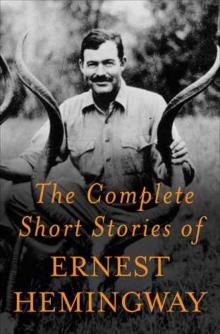 The Complete Short Stories of Ernest Hemingway
The Complete Short Stories of Ernest Hemingway Big Two-Hearted River
Big Two-Hearted River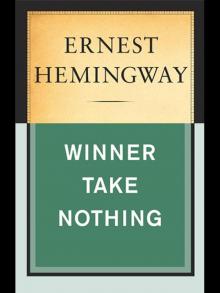 Winner Take Nothing
Winner Take Nothing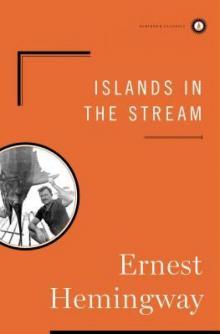 Islands in the Stream
Islands in the Stream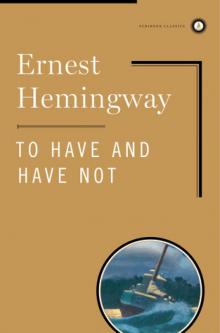 To Have and Have Not
To Have and Have Not The Snows of Kilimanjaro and Other Stories
The Snows of Kilimanjaro and Other Stories Across the River and Into the Trees
Across the River and Into the Trees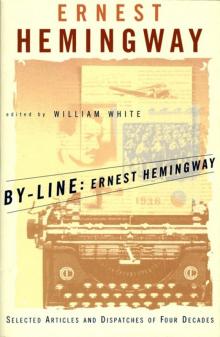 By-Line Ernest Hemingway
By-Line Ernest Hemingway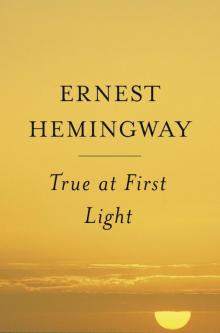 True at First Light
True at First Light Men Without Women
Men Without Women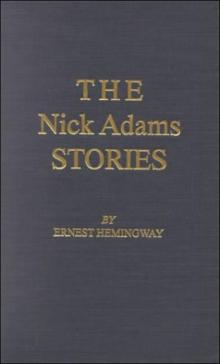 The Nick Adams Stories
The Nick Adams Stories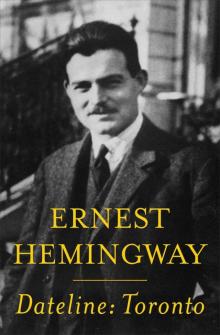 Dateline- Toronto
Dateline- Toronto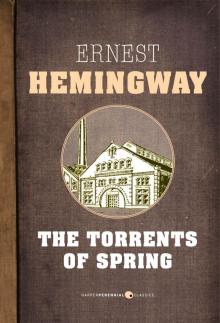 The Torrents of Spring
The Torrents of Spring Short Stories
Short Stories